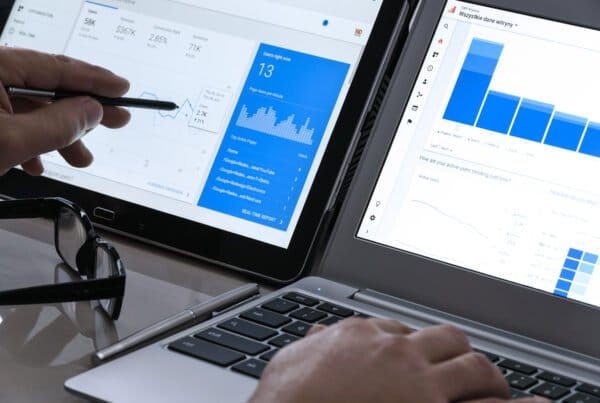We have written this article for businesses, specifically small businesses, who are contemplating the need for a website even if they are already a frequent user of social media. Perhaps some businesses know they need one but are having a hard time justifying the costs or are simply not seeing the bigger picture. We hope this article can help shed some light on how to best utilize social media while building a website all your own. Its 2012 and marketing continues to be challenging and ever-changing!
Having a presence on the internet is a modern day equivalent to being in the phone book.
Consumers have grown accustomed to being able to find basic information about a company by searching online. In fact, over 80% of search users utilize the internet to find local businesses that suit their needs. That number seems to grow every year.With that being said, if you are a business owner what is the best way for you to reach these potential customers?
Some business owners seem to be pondering the validity or need for a website to effectively market their business and ask us questions such as:
- Are websites a thing of the past?
- Is social media all that matters?
- Can you effectively run and market your business through Facebook and other social media?
The short answer is: Websites are a necessity.
Ever since the creation of Facebook business pages and fan pages there has been a growing trend. Small businesses with little to no marketing and advertising budgets have created a Facebook presence in lieu of a website to market their business. In 2011, 70% of local businesses were utilizing Facebook for marketing while only 45-55% of all small businesses nationwide even have a website. Along with poor management, insufficient capital, starting the business for the wrong reason and a poor location for the business, not having a website is one of the major blunders and reasons why small businesses fail.
The fact that around half of ALL small businesses do not even have a website proves that they are at risk of failure and they are missing out on a huge target market full of potential customers. Based on our own experience with our clients we understand that startup capital for small businesses is very limited so a website may seem out of the question but we encourage you to shop around and talk with different agencies. A website might just be much more affordable than you once thought; and in our opinion, as well as all the industry experts, you cannot afford to go without one!
Here are some simple statistics supporting that statement.
In 2011, in the U.S. alone, around 77% of the entire population are active internet users and over 80% of all internet users search locally for products and services they need. E-commerce sales topped out at over $165 billion in 2010 according to the US Department of Commerce. That does not even take into account the amount earned in sales that originated from a search user contacting a business via their website. If we are taking business leads and income generated from websites into account and not just internet sales, the statistic above would most likely double or triple and that is a conservative estimate.
An important point to make and acknowledge is: we realize not all businesses have products to sell or conduct their business transactions online. However, a website is much more than just a shopping cart. Although the numbers above reflect only sales made via the internet, your website can also be a tool for collecting leads, attracting potential customers to your business who would not have known about it otherwise, educating visitors about your products and services, informing customers of company news and product updates, and allowing the everyday online search user to find your website if they are searching for a related product or service.
With such a high percentage of internet users as well as consumers searching for businesses to work with through local internet searches it is astonishing that nearly half of all small businesses have yet to develop a website of any kind.
A growing number of businesses, through the increased popularity of Social Media, have become less concerned with a website and more concerned with social media. As outlined above, a web site has many functional uses for a business looking to continually attract new clients or maintain current customers. However, due to the upfront costs with developing and designing a website many small business owners have begun to rely solely on social media to promote the business.
So What is the problem with relying solely on Social Media such as Facebook?
Let us first recognize that we are BIG FANS of social media and utilize it for ourselves as well as many of our clients. However, it is one component to a larger marketing challenge and it has been irresponsibly advertised as a cure-all solution.
Social Media Benefits & Pitfalls
In simplest terms possible, social media promotes your product to your existing group of customers or subscribers. Think of this like preaching to the choir. Promoting and advertising to existing customers or even to subscribers who are already well aware of your product can actually do more harm than it can good (if this is your only method of marketing) and acts as nothing more than a “reminder” that you are still out there and more or less becomes background noise. Successful businesses who continually want to grow and expand their customer base must look beyond social media to attract the largest percentage of customers possible.
The Good
Social media can of course help your pool of potential customers grow by visitors sharing your page or products with others. This is also beneficial because if someone is sharing your page or products more times than not they had a pleasant experience and are looking to pass this along. In that sense, social media can act as somewhat of a silent referral for your business.
Facebook business pages specifically are excellent to help spread the word about products, services, and for others to share those experiences with friends, family, peers, and co-workers. These pages also provide a quick and easy way for users to find business contact information and learn more about the company perhaps without visiting the full website.
Of course the biggest draws to Facebook Business pages are the fact that they are Free and you have the potential of reaching over 500 million users. Although you have limitless attraction potential with your website, reaching millions of customers would take a heavy investment and more time than social networking could accomplish. So, we understand the attraction and encourage it to help build awareness and keep your customer base interested and informed.
Some other great benefits of Facebook Business Pages are:
- The use of custom applications that can help your fan/customer base use your product or service
- Creating an open dialogue with customers where they can directly reach out to you and get a quick response
- Create Quick Deals or Discounts
- Post industry related articles or write articles relevant to your page subscribers interests
- Post upcoming events
- Announce product & service news, updates, etc
- Page content is public and therefore Search-Engine Friendly
- Since there are 400 million active users at any time, Facebook makes it easy for users to share your page or products with others and in a short time you can potentially reach thousands of visitors
The Bad
With all the positive points we mention above it seems like a win-win for all. However, there are numerous pitfalls in this scenario and from our perspective it all comes down to one simple concept Control. Business Owners, just as the title implies, own their business, their products and services, and in many cases also own a large amount of assets in client contracts, projects, and ongoing reoccurring revenue from those customers. The simple fact is social media forces businesses to advertise and market within their set of rules. At any time Facebook can change the look, functionality, permissions, or reach that you currently are furnished. As many Facebook users know, a recent update to both profile and business pages has caused numerous problems for businesses who utilize their page for marketing and advertising and you can bet there will be more to come in the future.
Not having control over the look or functionality of your business page leads to an unprofessional feel and so much conformity from business page to business page that most pages seem to run together. Facebook does not give business owners the ability to tailor their page to the needs of their subscribers, nor design the page in a way that is representative of their product or brand. Also, at any time they can completely change page formatting and how you can communicate with your subscribers. Simply put, any sense of control you might think you have in a social media environment is only “perceived”, not actual. Also, the control you might currently have could change tomorrow without warning. Social media sites hold all the cards and the more heavy your reliance for reaching most of your customers, the worse off the impact will be when these changes occur.
One final specific issue with social media sites are business metrics. Metrics are a way in which you can measure your businesses reach, exposure, traffic, and what the visitors do once they reach your business online. With Social Media, metrics are limited or virtually non-existent. Some sites such as Facebook provide very limited data about page visitors and it would be next to impossible to use that data to develop an effective marketing strategy. In comparison, you can install custom business metrics software on your own website (for free) that can track very detailed info such as: how a visitor found your website, how long they stayed, what pages they clicked on, if they filled out a contact form, what keywords they used to find your website, etc. This type of information is vital when you want to make the effort to get to know who visits your business online and what their behaviors typically are. How else are you going to truly keep them interested and coming back?
And The Ugly
Here are some general concepts to consider why Social Media falls way short. As we said, social media IS a useful tool and helps support the overall campaign but does not replace or supersede the need for a solid website.
Credibility and Trustworthiness
In a world of large corporations and mid-size businesses having advertising budgets larger than your annual revenue, a small businesses trust and credibility are always a huge factor for customers who are considering doing business with you versus a larger company. You can’t afford to advertise like they do so having integrity and a professional approach is more important since all the advertising dollars in the world cannot hide a poorly run company. In most cases you rely on quality versus quantity unlike larger corporations.
A website takes your credibility one step further than an easy free business page such as Facebook would offer. Low Barrier marketing pages such as Facebook are more susceptible to scammers and the creation of fake business profiles made specifically to mislead or harm customers financially. Therefore actually building and owning a website implies a much higher level of credibility than businesses that have nothing more than a Facebook or social media presence, especially in the small business market. Your businesses professional image is seriously at stake if social media is your sole source of marketing and representation!
Investment
A website, although it can be costly, is an investment in your business. Someday you may want to sell the company and a business with an established website, consistent traffic, etc can be of great value to someone interested in acquiring or taking over your business someday. Over time a website becomes a great asset and increases in value. Social Media is just a form of promotion and does not involve ownership. Therefore, you lack the same opportunities from potential investors down the road.
Control & Ownership
As mentioned earlier, control is the biggest concept and pitfall of social media. With a website not only do you control and own the website but you can change it at any time. Social media websites force you to advertise according to their guidelines. This is especially a very big issue for businesses who conduct internet sales. Social media platforms do not allow you to sell or even follow up with potential sales leads like you could on your own website. Although it is not entirely impossible to build or conduct sales via social media, you are once again doing it on their terms and not your own. In addition you may be forced to pay a portion of sales revenue back to the social media platform used to advertise those products in the first place.
Centralized Marketing & Communication
Marketing in general needs a focal point, a central hub where all marketing originates and spreads out from there. A website is this focal point and can reach all potential visitors. Facebook and other social media reach a subset of visitors but that does not encapsulate the majority of potential customers that are out there. By utilizing your website as the central hub you can then drive all your prospects and leads from ALL sources back to the website. This allows you to deliver a consistent marketing message to all potential customers.
At the heart of all marketing is communication, especially in the case of social media. However, social media misses the mark because you are limited in how you can communicate with your subscribers. For example neither Facebook Business Pages nor Twitter allows you to actually email your subscribers. This is where once again a website shines. You are able to not only collect detailed information about your visitors but afterward you can choose on what level to communicate with them: email, chat, Facebook, phone, etc.
Although Beneficial, Social Media Cannot Do
We have already outlined reasons why social media should not and cannot replace a website or be used in lieu of a website. However we have not talked on a larger scale about the limitations of social media. Here are a few more points to consider where social media falls flat and does not provide the total package.
Social Media Replacing Traditional Marketing & PR
It is hard to pin point when the trend started but there is a major misconception that social media can replace a business’s marketing strategy. Social media is NOT a strategy but merely a channel to be used as part of your overall strategy. On many levels social media makes sense and can work for you but it should not consume all of your efforts. Social media’s greatest benefit is giving your brand or product both lift and exposure. However, without all the other marketing and advertising behind it to back it up, the exposure can fall flat.
Instant Success and Results
Success is a concept that is earned and not purchased or speedily attained. With social media just because you have started a Facebook or Twitter account and posted some info and a few photos you cannot and should not expect the followers and subscribers to pile up in a matter of hours or days. It is what your business does or delivers that will keep visitors coming back and that folds right into your overall marketing strategy: making sure that you are advertising and marketing a product that is of interest, use, or news worthy to others. This should also be the bottom line to any successful marketing strategy: identify who your target market is and if they have interest in the products or services you are selling.
Social media cannot identify who your target market is or if they are interested. It can simply help you get the word out and promote once you use it as part of the overall marketing plan. Social media must also be a long-term commitment where your company is actively using it to keep followers and subscribers informed on a regular basis. The more established your social media pages become over time the more credibility and social acceptance your products and services will gain.
Sales On a Traditional Level
Social media has a purpose, and it is not as a sales tool. It is a support method to reach sales goals and as a form of communication for marketing and advertising. Trying to use your social media page as a sales pitch will leave your fans and followers turned off. Social media is best for customer to company relations and relaying news about and pertaining to the company’s interests.
Final Thoughts
Although social media presents some wonderful advantages and additions to some traditional marketing techniques it simply cannot replace an overall marketing strategy and most certainly cannot replace a website. Social media goes hand-in-hand with a website and other marketing tools. One without the other will never be as strong so it is best to diversify and be aware of how each marketing tool should be used to the best of its ability.
Websites are of course an investment whereas most social media is free. However, you cannot put a price on the value a website bestows upon your company through:
- credibility gained through a solid online presence and marketing message
- professionalism based on the look of the website and how your company handles business generated from online sources
- ability to customize and tailor the website to your business
- attract traffic from all possible sources (including social media)
- conduct transactions and sales if needed
- be able to follow up with customers to complete the sale either in person, phone, email, or via the website
- follow up with potential leads and communicate openly with clients any way you choose
- track visitors statistical data to determine where your customers are coming from, how they find your business, and numerous other key pieces of data which will improve how customers find you and their behavior once they do
Vinci Digital has been working with numerous clients across all industries since 2004. We are well aware of the needs small businesses bring to the table and continually hope to find new ways to help them attract more and more potential customers.
Social media is a strong part of our marketing and advertising but it only helps drive more visitors to our website, spread the word about our business to others who may not have heard otherwise, as well as let us interact with our customer base who come to us with questions from time to time. For us it is simply a tool but in itself does not create sales, just awareness.
We hope you found this article both informative and useful and now realize that a website is a must have, not simply a secondary tactic to building a customer base. Have questions?Give us a call! 877-693-4695.












